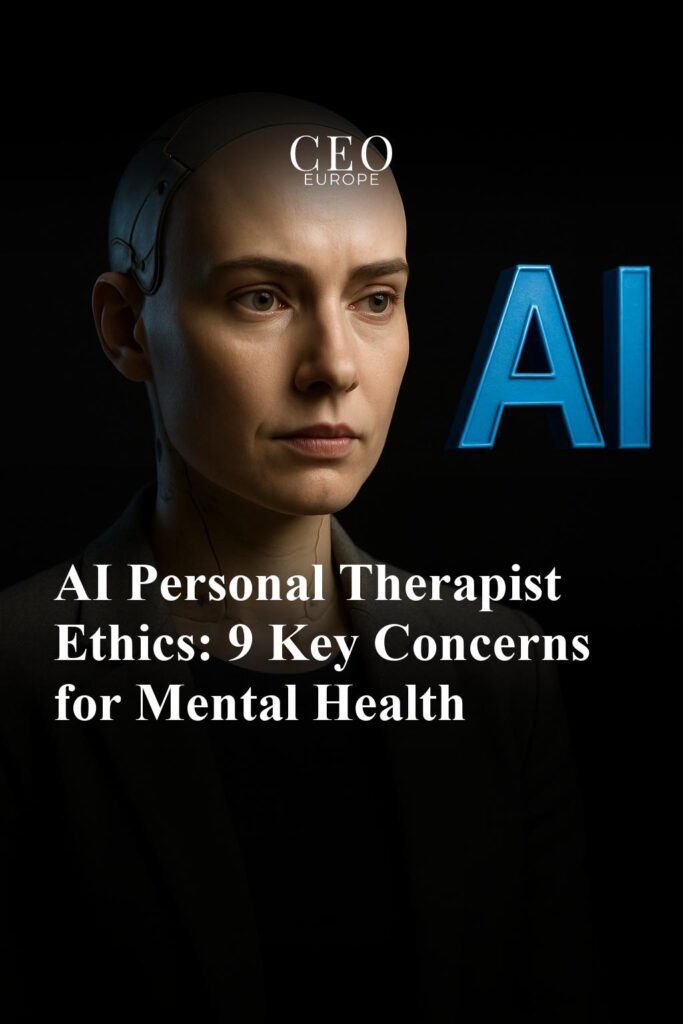1. Introduction
The rise of the AI personal therapist signals a provocative shift in mental health care, blending cutting-edge technology with intimate emotional support. As society embraces AI mental health support, ethics become paramount. This emerging field raises urgent questions: Can algorithms truly grasp human trauma? What risks lurk behind accessible, impersonal advice? While AI offers impressive convenience, potential dangers—from privacy breaches to misdiagnoses—cannot be overlooked.
AI therapy ethics challenge our trust in machines to navigate complex human feelings. The promise of round-the-clock accessibility is tantalizing but fraught with perils, such as neglecting deeper psychological issues or undermining human empathy. Before we capitulate to AI as substitute therapists, we must confront these ethical concerns head-on to avoid turning groundbreaking tools into clinical pitfalls.
2. Background
Therapy has evolved from face-to-face dialogues to digital parallels, but the entry of AI personal therapists marks a seismic shift. Unlike traditional therapy—rooted in human empathy and intuition—AI mental health support relies on algorithms decoding language patterns and behaviors. This transition draws historical parallels to the introduction of telephone counseling: both pushed boundaries between technology and personal care but with very different limitations.
Ethical challenges surface immediately. Confidentiality, informed consent, and potential bias in AI models prompt questions absent in traditional settings. Unlike human therapists navigating shades of nuance, AI’s rigid patterns risk oversimplifying complex emotional states. Ethical concerns thus extend beyond efficiency—impacting the very essence of mental health care’s human core [1].
3. Trends
AI personal therapists are gaining traction at an unprecedented pace. Many families now exchange family AI therapy recommendations, illustrating society’s growing reliance on digital mental health tools. This trend accelerates as users prioritize cost-efficiency and accessibility over traditional methods—even amid unresolved ethical dilemmas.
Studies indicate a sharp rise in AI therapy tool adoption, where users increasingly share AI mental health support platforms within their social circles. However, this normalization also pressures ethical standards and intensifies risks of overdependence on AI-driven insights without human oversight. Society’s embrace of AI therapists thus demands heightened scrutiny into the implications of this digital counseling revolution. On this note, exploring regulations such as the California AI safety law becomes crucial in shaping future standards [1].
4. Insights
Experts remain divided on the efficacy of AI personal therapists compared to human practitioners. Dr. Lance B. Eliot cautions that while AI can efficiently process data patterns, it falls short in genuine emotional resonance and complex diagnostics essential for sound mental health support [1]. This echoes a common analogy: AI therapy is like using a GPS for emotions—you get directions, but it can’t empathize with the journey’s emotional terrain.
Moreover, pitfalls include misinterpreting cultural contexts or missing subtle cues vital to diagnosis, potentially exacerbating mental health issues. These limitations underscore the irreplaceable value of human therapists’ empathy and ethical judgment, suggesting AI should serve a complementary role, not a sole substitute.
5. Forecast
The future of AI personal therapists is poised for exponential growth intertwined with evolving ethical frameworks. As AI advances, improved algorithms may offer nuanced understanding, but ethical guidelines must keep pace to prevent misuse or harm. We foresee stricter regulations and possibly mandatory hybrid therapy models combining AI efficiency with human empathy.
Society risks creating a divide where vulnerable populations rely blindly on AI, amplifying disparities in mental health care quality. Forward-looking governance like the California AI safety law will be pivotal in balancing innovation and responsibility. Ultimately, AI personal therapists may become indispensable tools—if guided wisely by ethical stewardship [1].
6. How-to
Evaluating whether an AI personal therapist is right for you requires critical consideration of ethical boundaries and personal needs. Start by assessing the AI’s data privacy policies and transparency about limitations. When confronted with family AI therapy recommendations, discuss openly about risks versus benefits rather than accepting suggestions blindly.
Maintaining ethical use involves combining AI insights with human consultation, not substituting one for the other. Always verify if the AI platform has expert oversight and clear protocols for emergencies. Remember, AI therapy is a supplement—akin to using a calculator for complex problems—you still need the human brain to interpret results thoughtfully.
7. FAQ
Q: Can AI personal therapists replace human therapists?
A: No. While AI offers accessibility, it lacks empathy and complex judgment essential for holistic mental health care.
Q: Are AI therapy ethics regulated?
A: Regulation is emerging but inconsistent; laws like California’s AI safety act aim to establish clearer ethical frameworks [2].
Q: Is AI therapy safe for families?
A: Family AI therapy recommendations require scrutiny to avoid overreliance on unvetted AI tools, which may miss critical emotional cues.
Many fears stem from misconceptions that AI can “cure” mental illness. In reality, AI is a tool—not a replacement for comprehensive human support.
8. Conclusion
The ethical landscape surrounding AI personal therapists is riddled with complexities—from privacy to emotional authenticity. While technology evolves rapidly, these nine key concerns call for a measured approach that respects both innovation and human dignity. AI mental health support should augment, not replace, traditional therapy.
As AI becomes embedded in our emotional lives, critically assessing its role is not just prudent but imperative. Only by demanding ethical clarity can we harness AI’s benefits without sacrificing the nuanced care that defines true healing.
Sources and references
1. Dr. Lance B. Eliot, Loved Ones Are Recommending That Their Partner Or Family Member Use AI As A Personal Therapist, Forbes, https://www.forbes.com/sites/lanceeliot/2025/10/06/loved-ones-are-recommending-that-their-partner-or-family-member-use-ai-as-a-personal-therapist/
2. Explore the California AI safety law’s 7 rules for labs, https://ceoeurope.eu/technology/california-ai-safety-law-2025/

